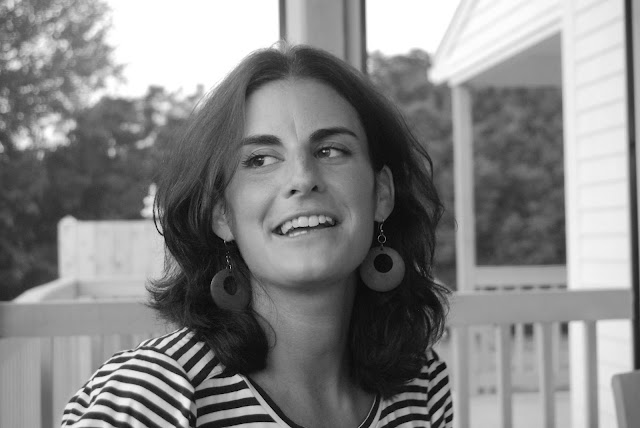I Googled Pop: A Tribute
Just about two weeks ago, I Googled my grandfather, Pop. I'm not sure why I was searching for something about him on the Internet, aside from the fact that I just missed him. I miss all of my grands. (I always was, and will forever be, a very lucky grandchild.) I read a story recently about how Lisa Niemi, the late, great Patrick Swayze's wife, still texts her husband "I love you" before she boards a flight. I think she said she figured something along the lines of, either Patrick gets the message somewhere far beyond this mortal coil, or someone who now has his old cell number receives the text. Angel in Heaven or paper boy in downtown L.A.: Either way, it's a good thing to know how much you're loved.
My motive was similar. I wanted to reach out and "find" Pop, I guess. I figured there would be some type of article he wrote or edited online, or a morsel of information that would satisfy my odd need to find his name in virtual print... To find that he existed online. To find him. See, as an editor of a newspaper in the Boston area for decades, he was always covering the news and writing stories. But, in my logic, wasn't he also news? Isn't he a story? Oh, to his family, he is the story. But online today? He's an obit. It's all I can find. And I'm sure that'd be just dandy with Pop, as he was never a proud man - never had the need to be recognized for his excellence. But it's not fine with me. I'm more needy. I'm a proud granddaughter.
So. Yesterday I was cleaning out the monkeys' closets (Good times!) in preparation for the big boy/big girl bed unveiling later this month and I came across a yellowed and worn copy of The Penn State Journalist, in which my article about none other than Richard W. Carlisle appeared. I sat down in Lila's closet and opened it up carefully, so as not to tear the most likely only copy of said issue of publication in existence. In my almost 3-year-old, beautiful, soft and silly girl's newly vacant closet, I huddled in the corner to re-read the story I had written 20 years ago about my sweet Pop:
An Editor Fights to Regain His Wit
~ by Jennifer A. Church, sixth semester journalism major from Staatsburg, N.Y., Penn State Journalist, April 1990, page 7
Richard Carlisle said: “Apple.”
“No, dear,” Jini said. “It’s a tree.”
“I know that,” he said and handed the black-and-white flash card back to his wife.
As Carlisle stood and leaned against the back of his favorite worn reclining chair, he took another sip of lemonade, a perfect solution to the hot and muggy afternoon.
The stroke happened almost two months before and his recovery, although limited, was significant. The doctors at Quincy City Hospital called it a miracle.
Carlisle’s frustration lay much deeper than what could be determined from the surface.
“It’s hard,” he said, settling into the leather recliner. “I know what things are… I know the words, I just can’t…”
“I know,” Jini whispered.
Richard Carlisle was born 74 years before his stroke in Quincy, a suburb of Boston where many other upper-middle class families lived. He was brought up with four sisters in a rambling three-story house.
Since he was ten, Carlisle knew he wanted to work for a newspaper.
His father gave him a printing press when he was 12 which immediately became his prized possession. He would come home from school every day and head up to his room to spend hours printing stories he would write himself.
During high school, Carlisle performed many odd jobs in order to help support his family during the Depression. In 1934, he graduated from Quincy High School and was accepted to Boston University. It was there that he was able to receive a much yearned for education in the field of Journalism.
“Journalism was, is, and will always be one of Pop’s greatest loves,” Kate Carlisle, a reporter for the Washington Post said with admiration for her father. “He loves it so much he has passed it on to me.”
The summer after his freshman year, Carlisle met a man named Col. Henry Teague who gave him his first job with a paper. Teague owned Mount Washington in New Hampshire, as it was not uncommon to own such a thing back then. He came up with the idea that what Mount Washington needed was its own newspaper.
Carlisle was responsible for the front page. Every day he would write the stories and set the type himself. The back page, as there were only two pages, rarely changed. It consisted solely of the various “legends” of Mount Washington.
“What a smart man, with such a love for words, and history and the language we speak,” Jini said, looking at her husband. “Even back when he worked up on Mount Washington he had this incredible love for it all.”
“That’s a cat.”
“Very good, Dick. Only a few more.”
During the summer of 1936, Carlisle worked for an Italian language daily newspaper in Boston called La Notizia. That fall, since he did not have enough money to finish college, he joined the Quincy Patriot Ledger.
His first job with the paper consisted of going to different reporters south of Boston and getting stories from them to bring back. In the following years he made his way up the ladder from night editor to night city editor, city editor, news editor, and finally to associate editor, the second position in command.
During these years, Carlisle also managed to get married, become the father of four, and volunteer for the Army where he was a navigator at different bases along the east coast. He also studied the history and geography of Quincy to the extent that his colleagues say he has “doctorates” in each.
“Dick was always the first to send off a note if a reporter wrote ‘Lincoln Square’ for Lakin Square or confused Faxon Avenue with Faxon Road,” said Mike Saint, a reporter for the Patriot Ledger.
“Key?”
“No, dear. That’s a door.”
During his nearly 40 years at the Patriot Ledger (Quincy has since been dropped from the name), Carlisle found time to visit schools in the area and give seminars on how newspapers are put together. He spent many of his Saturdays at high schools teaching the students how to improve upon their own newspapers.
In a letter to Carlisle sent in 1979, the publisher of the Patriot Ledger, K. Prescott Low, writes:
“For me, and for hundreds of other younger journalists intent on learning the trade, you have stood out as an example to be followed and respected.”
Upon his retirement in 1979, Carlisle’s colleagues made a special edition of the paper just for him and the staff of the Patriot Ledger. This is where they said their good-byes. The headline reads: “Highest Newsman in the East Retires.”
Vicki Fitzgerald writes: “For all these years, it’s been Carlisle I’ve turned to for expert advice on newspapering problems from ethics to grammar, for a shoulder to cry on, and – most important – for chuckles. He has the authentic wry sense of humor and his jokes unfailingly make me laugh – though sometimes only a half hour later. Take his standard parting shot, ‘Well, goodnight, kid,’ as I leave at lunch hour or for morning coffee. Even after 19 years, I fall for it every time.”
Other members of the staff remember the times Carlisle would say “Welcome back!” after they had only returned from another room.
Carlisle, with his plaid flannel shirt, rosy cheeks, and easy smile make his sense of humor almost expected. His black-and-white glasses, carefully combed white hair, and intense eyes help to key in on the intelligence that lies beneath.
Peter Knapp, a reporter for the Patriot Ledger, wrote: “He has met our daily crises with good humor and equanimity; comforted the lugubrious and the sulky; repaired our grammar and de-escalated our vocabulary; and put our pretensions into the perspective of history: ‘A week from now, it won’t matter.’”
“Pete: ‘Tomorrow the British government may fall.’
Dick: ‘What time?’”
Ten years after his retirement, on June 6, 1989, Carlisle suffered a cerebral hemorrhage and lost this wit and knowledge in an instant. The stroke was in danger of taking his life, but simply took the biggest part of it, instead.
Carlisle’s doctor introduced him to his wife in the recovery room.
“I don’t know you,” Carlisle had said, “but you’re very pretty and I’m sure we’ll have a good time together.”
The stroke had severely damaged Carlisle’s language and speech center. He was immediately unable to recall names, faces, facts…
“He’s the most intelligent man in the world,” his daughter, Susan Carlisle, a professor of writing at Harvard said. “It’s so sad. All those years of building up all of that knowledge and it’s gone like that. Thank God he’s alive.”
A week after Carlisle was released from the hospital he beat his wife at a game of cards. The numbers were still there…
Visits were short at the Carlisle home. He would get frustrated. Meeting people for the first time after knowing them for nearly a lifetime was hard for him to handle.
“I remember Dan,” Carlisle said. “She’s the one who we met at the… the… oh, come on, I know this one…” (Because of the stroke, Carlisle was unable to recall the correct gender of people.”
“We met her at the reunion about three years ago when…” Jini would then tell him the whole story of how they had met and where and when. Her husband deserved to know everything he used to know.
Within weeks a speech therapist named Mary Bresnahan began visiting the Carlisle house. She went over nouns and verbs and pronunciations and definitions and spelling and nouns and verbs and pronunciations and definitions and spelling.. She gave Jini flash cards to go over with her husband. Bresnahan’s job was done within a few months. It was now up to them.
The past year has been one of frustration, determination, and success for Carlisle. No more flash cards. He reads Agatha Christie novels now.
“I’m actually very lucky,” Carlisle says. “Not everyone can read a mystery twice and be surprised by its ending both times.”
The two sit down in their living room. One reads the New Yorker, the other opens the Patriot Ledger.
“Ha! Found a mistake,” he laughs.
While I would change certain things today about the way I wrote this personality profile 20 years ago, my love for Pop will never change. It spans print and the Internet. I will ensure his memory lives on (and therefore, so will he) with wonderful stories I tell to my children, and to theirs. And I was silly to be angry that the Internet didn't have their news on target. Maybe they never knew about the way he'd make animal figurines jump from one shoulder to the other, with just a quick shrug, for an audience of 2- to 8-year-olds standing in rapt attention in his dining room. Maybe the stations were never alerted to his sometimes quick, but always meaningful hugs. Maybe the networks of today will never know how much Pop dearly, and wholly loved his wife. Perhaps they have no idea that anyone Richard W. Carlisle called "kiddo" was someone who deserved the utmost of respect. And I can guarantee they were never there to witness the greatest news story of all... Oh, but let's just let Pop tell you that.
Sometimes, when one person is missing, the whole world seems depopulated. ~Lamartine



Comments
Only in my memory. Pop...